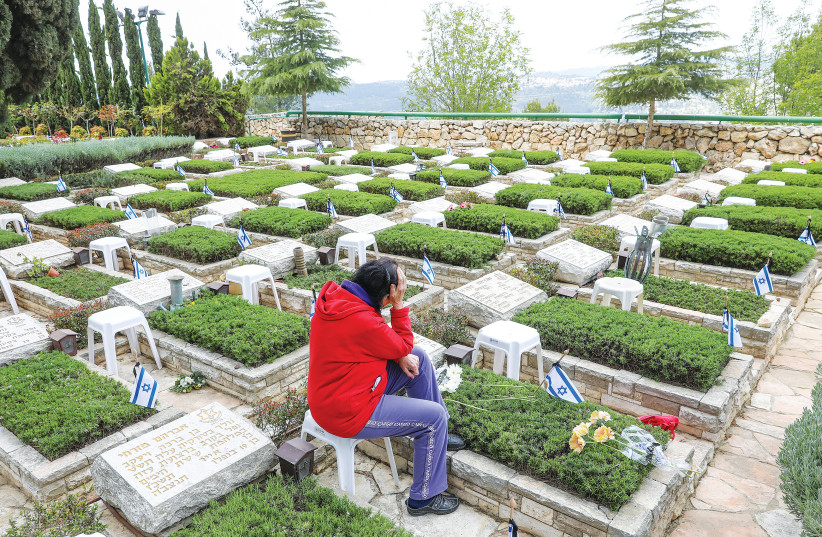"You only brought four chairs; there are five of us," I said to the man delivering the low chairs for my late father’s shiva. Suddenly, Didi, my brother-in-law, gently corrected me. “Ben,” he said, “you need four chairs.”
At that moment, it struck me that my father had passed away.
Since then, I often find myself reflecting on my father’s passing. It is during such moments that I experience a profound sense of love, pride, and appreciation for my Jewishness.
This may seem strange, but let me explain. I lost my father a week after my 30th birthday, which proved to be an incredibly distressing and challenging time. Losing a parent can leave you feeling adrift and disconnected. You have one less person in your corner, and you can experience a profound sense of isolation and loneliness.
When conversing with friends who have also experienced loss, I hear them express the same sentiment: “I felt lost.” I see them, even as the years roll on, unable to move forward from their grief. They find themselves unable to embrace healing and are trapped within an endless cycle, incapable of overcoming their profound loss.

Judaism gives a structure
Observing them, as I have, makes me feel incredibly sad, while also incredibly thankful for the grief structure that Judaism has provided me. Despite the devastation and shock, I never felt lost. Unlike my non-Jewish friends, I had a framework that enabled me to deal with the loss of my father.
One remarkable aspect of Judaism is the instruction manual we are given on how to navigate the grieving process. Before my father’s funeral, I carefully selected an item of clothing to tear for the act of kri’ah. Cutting the black T-shirt I wore under my sweater for his funeral felt hugely symbolic.
It’s hard to describe, but it was a physical act that manifested the severance I was feeling. I have kept the T-shirt that I ripped, and though I don’t look at it very often, occasionally I will bring it out to feel it and to feel connected to my father.
My father passed on a Shabbat evening and was buried by Tuesday. This rapid turnaround actually became a blessing, although it was something I dreaded previously. Although he had been ill for some time, his passing was still a shock and the speed of the funeral meant I was still in a state of shock during the service. But then, through shiva and shloshim, the 30-day mourning period, I was given an opportunity to begin to process my loss.
My daily repetitions of the kaddish prayer were a salve that gave me focus and purpose. Per customs relating to the 30 days following my father’s death, I did not shave or cut my hair. When you lose a parent, your life is divided into pre-loss and post-loss. This was represented in my unkempt appearance. I didn’t look like myself because I no longer was myself, at least not the person I had been.
AS THE years pass, we are granted a moment to engage with our grief through the observance of yahrzeit, the anniversary of the death of a parent or close relative. Every year, I light a yahrzeit candle. In that moment, I am transcending time, allowing myself to fully feel and experience the grief that becomes tempered with the passage of time and the demands of life.
Having this dedicated moment to shed tears and mourn makes the rest of the year manageable. It allows me to move forward and get on with my life, without feeling guilty. Although I often think of my father, these practices allow me to continue to process his loss in a structured, meaningful way without being constrained by it. Yahrzeit acts as a pressure valve, allowing these feelings to flow through me and into the world.
Just as I was given guidance when my dad first passed away, I am now provided with a manual on how to commemorate him. When I recite kaddish, I am not doing it to exalt God’s name, although that is the translation of the prayer. I am honoring my father, following in the footsteps of his own mourning, as well as his father’s and generations before him.
What is particularly remarkable is how that comfort came to me despite identifying as a secular Jew. It is in these practices that I discovered, on a deeper level, the profound beauty of Jewish practice and its significance in my life. By engaging with Jewish customs, I felt a connection to the unbroken thread of Jewishness that stretches throughout history.
It is truly extraordinary that every Jew, myself included, is intricately linked to the vast tapestry of Jewish life through various aspects, such as customs and traditions.
I love being Jewish. In fact, I am so passionate about it that I have written books dedicated to building a modern Jewish Pride movement. However, it was during my father’s passing that I truly grasped the profound significance of Jewish rituals. These carefully crafted practices, passed down through generations, provide structure, comfort, and direction in our lives. They go beyond mere traditions. If we allow them, they can offer us a compass for navigating the trials and tribulations of life.
If embraced fully, Jewish rituals have the power to transcend the mundane and touch our core. They have a timeless impact, enriching our lives in countless ways. They connect us to our cultural heritage and foster a sense of belonging to a vibrant Jewish community across time.
These customs serve as reminders of our values, traditions, and wisdom that have shaped our civilization. They are not merely traditions, but remarkable tools that can profoundly enrich our lives if we open ourselves to their transformative power.
The writer is the founder of the modern Jewish Pride movement, an educator, and the author of Jewish Pride: Rebuilding a People.
